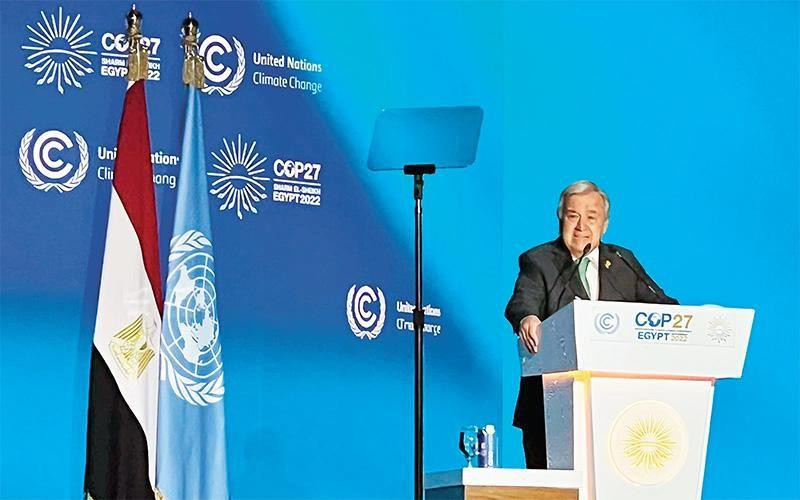Meanwhile, several new commitments and agreements were made during the second working day of the Conference.
Cooperate or perish
Speaking at the first official session, the UN Secretary-General Antonio Guterres warned that the world is facing a fierce choice between cooperation in reducing emissions or pushing future generations into a climate catastrophe. He said that humanity must choose between climate solidarity or “collective suicide”. The world's population is about to reach 8 billion people. The UN’s leaders asked the parties to discuss and propose a “solidarity pact”, under which all countries would make greater efforts to reduce emissions, while rich countries and international financial organisations support developing economies to accelerate the transition and end the dependence on fossil fuel, drastically reduce emissions and improve capacity to respond to climate change.
As the host, Egyptian President Abdel Fattah El Sisi also called on the parties to quickly, effectively and fairly implement their climate commitments. He noted that the world can only get through the current climate crisis using practical steps, not just commitments and slogans. World leaders need to deliver clear messages, including measures to carry out their commitments.
Calling on all parties to fully implement their commitments, the President of Senegal and the Chairman of the African Union emphasized, that the rich countries’ commitment to providing 100 billion USD per year, in support for poor countries in response to climate change, is not enough and it is necessary to raise at least 200 billion USD per year. He also said African countries also support a fair green transition, even though the continent's "contribution" to the total global emissions is very low.
Strengthening cooperation frameworks
At least 25 countries agreed to join a new cooperation mechanism called the Forest and Climate Leaders' Partnership (FCLP), which pursues the goal of ending deforestation by 2030. At COP26, more than 100 leaders signed an agreement to eradicate deforestation by the end of this decade, but few countries enacted more stringent policies and provided more funds for the effort. With a group of member countries accounting for about 35% of the world's total forest area, the new cooperation framework is expected to make a step forward in protecting the "green lungs" of the earth.
Colombian President Gustavo Petro announced that Colombia will contribute 200 million USD per year for 20 years, to the projects of protecting the Amazon rainforest. The Colombian leader called on funds and donors to stop investing in fossil resources and supported the initiative of “green debt swaps” from the International Monetary Fund (IMF) and the World Bank (WB). Accordingly, developed countries will write off or relax debt for low-income countries, to promote sustainable development projects.
A group of the 14 largest food businesses in the world has introduced a blueprint for achieving the 2025 climate goal, including the elimination of the entire deforestation from supply chains linked to soy, beef and palm oil. This is considered an important step in the fight against climate change as the exploitation and destruction of forests for cultivation and farming have released a large number of greenhouse gases.
Meanwhile, leaders from nearly 50 countries and international organisations launched the International Drought Resilience Alliance, which was formed under the proposal of Senegal and Spain. In a joint statement, the Prime Minister of Spain and the President of Senegal noted that the mission of the alliance is to create political momentum to make the world's soils more resilient in the context of drought and climate change. A start-up fund of 5 million EUR has been announced by Spain to support the activities of the alliance.
New commitments
Rich countries have backed South Africa's plan to transition from coal, paving the way for the 8.5 billion USD deal to help the African nation decarbonise. This agreement can be seen as a template for other developing countries. According to the announcement, the UK, France, Germany, the US and the EU, will support South Africa in the form of aid and loans.
The Netherlands has announced that it will increase the annual contribution to climate finance by developing countries to 1.8 billion EUR by 2025, about 50% higher than in 2021. Germany and Belgium have joined with several other rich countries to commit to helping developing countries overcome the damage caused by climate change. Accordingly, Germany contributed 170 million EUR and Belgium contributed 2.5 million EUR.
Meanwhile, the Bill & Melinda Gates Foundation launched by the tech billionaire has pledged aid of 1.4 billion USD, to help small farmers cope with the impacts of climate change. The Foundation estimated that more than 2 billion people depend on food supplies from smallholder farmers, but less than 2% of global climate-related funding was spent helping farmers adapt to climate change.
The World Trade Organisation (WTO) called for the removal of trade barriers for environmental goods and services to support the fight against climate change. In its report at COP27, the WTO stated that while trade contributes to emissions during production and transport, it also accelerates the diffusion of advanced low-emission technology and creates many jobs, making a great contribution to joint efforts in response to global climate change.
















